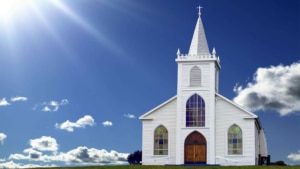The National Bureau of Economic Research has made a shocking discovery.
Polling data routinely indicates that about 22 percent of Americans report attending religious services on a weekly basis.
However, by analyzing geodata from the smartphones of more than two million people in 2019, researchers found that just five percent of Americans attended religious services weekly – significantly lower than the information reported to pollsters.
This means a whole bunch of reportedly Godly people are big, fat liars.
Not only are they lying to pollsters, but they are lying to pollsters to make themselves appear more religious to a pollster – a person who they will never see again.
That’s so weird.
They’re also lying about their relationship with God, which probably won’t sit well with a deity whose FIRST THREE Commandments (30% of total Commandments) are all about not dishonoring him.
That’s a lot of rules related solely to him.
God chose to leave rape, assault, slavery, bigotry, human trafficking, racism, sexism, and child abuse off his list of Commandments in favor of warnings about believing in other Gods, taking his name in vain, and making false idols. Yet, these religious folk are lying about attending his house of worship on Sunday?
This seems risky at best.
Yet another commandant demands that the Sabbath Day be kept holy, which essentially means go to church, damn it, and certainly don’t lie about going to church. Keeping the day holy also means that you can’t work on Sunday (the Bible calls for you to be stoned to death if you do), nor should you be playing golf, going to brunch, mowing the lawn, or attending a ballgame.
All of these activities are strictly forbidden on Sunday, presumably alongside lying about attending religious services.
But if only five percent of religious people are attending services on Sunday, more than three times that many are lying about it, and a kabillion percent more are openly admitting to not attending services despite their belief, what the hell is going on?
Has that Sabbath Day commandment been repealed?
I’m a reluctant atheist. I wish I could believe in a higher power, eternal life, and the possibility of a golden halo, but so far, I have failed to find the faith I so desire, but not for want of trying. I’ve attended many places of worship throughout my life. Explored a variety of religions. Read the Bible cover-to-cover three times, plus parts of it many other times.
I’ve never met another human being who’s read it cover to cover once.
So far, no luck. I want to believe but simply cannot.
But if there is a God, and someday I meet him or her or they at the Pearly Gates, I hope he or she or they might say something like this:
“Listen, I would’ve preferred that you’d believed in me while on Earth, but you certainly tried. I give you loads of credit for making an effort and possessing the desire to believe.
Yoda said, ‘There is no try. Do or do not,’ but he was fictional. He also failed to defeat the Emperor and ran away. Where was his ‘Do or do not” then?
But I digress. Effort counts for a lot. And unlike a bunch of supposedly religious people, you never lied about attending church services to make yourself look better to some random pollster, which is weird. Right?
Who cares what a pollster thinks about you?
So you get a failing grade in faith, but you get a gold star for not lying about it, and you’ve earned an A+ for reading that book three times. Even I haven’t read it three times.
You also didn’t commit any of those awful sins that I left out of the commandments, which was great. What the hell was I thinking not including rape and bigotry and child abuse off the list?
So, taking all of this into consideration, congratulations! Welcome to heaven! Now let’s go make fun of those people who lied to random pollsters before sending them to Hell to burn in eternal damnation!”
I still can’t believe that people would lie to pollsters about attending religious services.
I also can’t believe how many churches, temples, and other religious facilities exist in our country, given that less than five percent of Americans enter these houses of worship on a regular basis.



